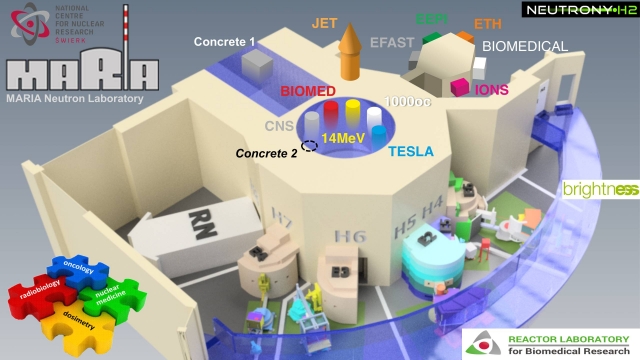Symposium: Neutron Sources
07-07-2022
On June 22–23, 2022, a symposium devoted to the development of neutron research in Poland and Europe Was held in Świerk. The symposium initiated cooperation between Polish institutions, universities and scientists on the part of neutron source users (the „Neutrons for Polish Science” consortium) with operators and constructors of neutron generating infrastructure (including the MARIA reactor, DONES, ESS).
The presentations on the first day of the symposium concerned the MARIA reactor and neutron research conducted in research and academic centers in Poland. The second day of the symposium concerned the conceptual, design and engineering contributions to the emerging neutron sources abroad, i. e. ESS (European Spallation Source) and IFMIF-DONES (International Center for Thermonuclear Irradiation – Neutron Source Oriented DEMO). The symposium Was attended by scientists from leading European and Polish centers conducting neutron research and participating in the construction of future research infrastructures. The group of participants included, among others prof. Andreas Schreyer, ESS Research Director, Prof. Angel Ibarra, director of the IFMIF-DONES consortium, prof. Wojciech Zając chairman of the „Neutrons for Polish Science” consortium, PhD. Eng. Michał Gryziński representing the international research consortium BNCT and MARIA Neutron Laboratory, as well as prof. Wojciech Królas, prof. Adam Maj and prof. Marek Scholz representing the IFJ in the field of work carried out in connection with the discussed infrastructures and ITER. The dialogue conducted among the participants pointed to the possible future in the MARIA reactor of a significant development in the construction of measuring devices for neutron diagnostics at European neutron sources (ESS, DONES) as well as in programs supporting the development of thermonuclear technologies (ITER – International Thermonuclear Experimental Reactor).
A special role in neutron research is played by the Polish intensive neutron source – the MARIA research reactor operating at NCBJ (with a work perspective until 2053). Its role on a European scale is noticeable and will continue to grow with the progress of the ongoing expansion of the laboratory facilities and the modernization of the reactor itself. The graphic shows the devices currently in use, installed and under construction in the MARIA reactor. In addition to research related to nuclear and thermonuclear physics and material research, the starting neutron source on the H2 channel of the MARIA reactor deserves special attention. It is a source of fast, epithermal and thermal neutrons of high density and size – invaluable for biomedical research, in particular for the European cancer program. (Image: NCBJ)





